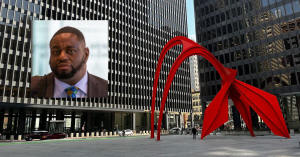Feds set to rest case in Sen. Emil Jones III red-light camera bribery
trial
[April 16, 2025]
By Hannah Meisel
CHICAGO — On a still-warm early fall morning in September 2019, federal
agents walked into the Illinois Capitol building in Springfield and left
with boxes of evidence collected from the legislative office of
then-state Sen. Martin Sandoval, D-Chicago. Roughly 200 miles north,
more agents executed search warrants on Sandoval’s home on Chicago’s
Southwest Side and his district office in the nearby suburb of Cicero.
But before word of the public raids made the rounds on social media and
into early news reports, Sandoval’s colleague, State Sen. Emil Jones
III, D-Chicago, got a knock on his door at his home on the South Side of
Chicago. At first, someone who identified himself as Jones’ cousin told
the two FBI agents that the senator wasn’t home — but a little while
later recanted the lie and invited them back in from their car.
“How you all doing?” Jones asked the agents, to which FBI Special Agent
Timothy O’Brien responded, “Good, good good. How are you?”
“Well, the FBI is at my door, so,” Jones replied with a small laugh.
Nearly six years later, O’Brien took the witness stand Monday afternoon
in a Chicago federal courtroom with Jones about 30 feet away flanked by
defense attorneys as the lawmaker’s corruption trial nears its end. In
the final 20 minutes of testimony before the jury was sent home for the
day, prosecutors played the first few moments of the secretly recorded
interview with Jones.
The pair of agents can be heard in the 2019 recording telling Jones that
they were investigating Sandoval and wanted to ask him some questions.
But they didn’t tell Jones that he was also a target of their widespread
probe.
When Assistant U.S. Attorney Prashant Kolluri asked O’Brien on Monday
why he didn’t tell Jones that information, the agent said that if he’d
come right out and said it, there was a “potential that he would not
speak with us.”

“And did he ask you whether he was under investigation?” Kolluri asked.
“He did not,” O’Brien said.
Jurors will hear the remainder of the roughly 40-minute interview on
Tuesday, during which prosecutors allege Jones lied to O’Brien and his
partner — the basis for one of the three charges Jones faces.
The feds also allege Jones agreed to accept bribes from red-light camera
entrepreneur-turned-FBI cooperator Omar Maani in exchange for changing a
piece of legislation he’d proposed in early 2019 that Maani worried
could harm his industry.
Prosecutors say it doesn’t matter that Jones never received the $5,000
from Maani, nor did he ever narrow the legislation in the way that Maani
asked for. The only agreement that did come to fruition was a job — or
at least several weeks’ worth of payments from Maani — for Jones’ former
intern, Christopher Katz.
The jury last week heard Maani quantify the number of people he made
secret recordings of as “dozens and dozens and dozens” in the roughly 20
months he was an undercover FBI cooperator beginning in January 2018
until the public raids on Sandoval and others on Sept. 24, 2019.
FBI Special Agent Kelly Shanahan on Monday reiterated that Sandoval was
one of the public officials Maani helped the government to charge; the
senator pleaded guilty in early 2020 after he began cooperating with the
feds’ ongoing investigation. In fact, Shanahan felt moved to “pay my
respects” at Sandoval’s funeral after he died in December 2020 from
COVID-19 complications. At the time, Shanahan had been working with
Sandoval for about a year and said that while she and the two IRS agents
who attended the funeral weren’t invited, the late senator’s wife and
daughters thanked her for coming.
But Shanahan also revealed Monday that the FBI gave Maani about $75,000
to give to Sandoval during the course of Maani’s cooperation. While
Maani had been giving Sandoval perks like cigars and meals for years
before the feds approached him, he began giving Sandoval cash after
January 2018.

The bribes were meant to buy Sandoval’s continued protection of the
red-light camera industry as the chair of the Illinois Senate
Transportation Committee. But they were also an exchange for the
senator’s help intervening when the Illinois Department of
Transportation opposed the approval of red-light camera installations
proposed by certain suburbs.
At a June 2019 dinner meant to facilitate a relationship between Maani
and Jones, Sandoval demonstrated his own close friendship with Maani,
inviting Jones into the circle.
“I’m glad you came, Emil,” Sandoval said. “Omar wants to be your
friend.”
After Jones left the Oak Brook steakhouse that night, Maani gave
Sandoval his latest installment of cash, which had been in his pocket
throughout the hourslong dinner.
Jones didn’t catch the FBI’s attention until March 2019 — more than a
year into Maani’s cooperation with the government, after Maani brought
up Jones’ newly proposed legislation to Sandoval, who apparently
suggested brokering a meeting. Shanahan on Friday said that the FBI
“found it interesting” that Jones, “who had filed legislation on
red-light cameras,” would be willing to meet with Maani, a co-owner of a
red-light camera company.
[to top of second column]
|

Prosecutors are set to rest their case Tuesday in State Sen. Emil
Jones III’s federal corruption trial at the Dirksen Federal
Courthouse in Chicago. Jones is accused of agreeing to accept bribes
from a red-light camera entrepreneur-turned-FBI cooperator and lying
to federal agents about it. (Capitol News Illinois photos by Hannah
Meisel and Andrew Adams)

Maani’s cooperation also helped the feds nab a handful of other public
officials who accepted bribes, including mayors of small suburbs just
southwest of Chicago who were convinced to pursue red-light cameras from
Maani’s company, SafeSpeed.
According to Shanahan, some of those mayors also accepted both cash and
other gifts from Maani.
Jones’ defense lawyers jumped on the disparity between what those
officials asked for and received versus Jones’ experience with Maani.
Attorney Vic Henderson asked Shanahan whether Jones got “any cigars” or
“Any tickets to events? Any flights to faraway places?”
“No,” Shanahan said to all three.
“He got a steak, correct?” Henderson asked.
“Yes,” Shanahan said.
“And he got a lemonade,” Henderson stated.
“I believe that’s what he had,” Shanahan replied.
Henderson also asked Shanahan why the FBI didn’t give Maani cash to try
to entice Jones at the June dinner, to which Shanahan replied that she
didn’t “believe there would’ve been a basis to do that.”
“This was the first time Omar was having dinner with him,” she said of
Jones.
“So you didn’t believe he would’ve taken any money in June?” Henderson
asked.
“I don’t know that,” Shanahan said. “It was a first meeting.”
But a few weeks later in July 2019, as Maani treated Jones to dinner at
the senator’s favorite steakhouse, money did come up as Maani pushed
Jones to name a dollar amount that he could contribute to an upcoming
campaign fundraiser. After a few minutes of demurring — and chewing his
wagyu beef filet — Jones finally acquiesced.
“If you can raise me five grand, that’d be good,” the senator said.
“Done,” Maani replied.

“But most importantly, I have an intern working in my office,” Jones
told Maani. “And I’m trying to find him another job, another part-time
job.”
It turned out that the intern, Christopher Katz, hadn’t worked for Jones
for a year at that point. Prosecutors on Friday showed the jury
late-night texts between the two, with Jones asking Katz — more than 15
years his junior — “I want to see u after” Katz was finished at a strip
club.
Jones’ attorney Vic Henderson on Monday pushed Shanahan to agree with
his contention that the case was “not about a relationship between the
senator and Chris,” but was quickly admonished by U.S. District Judge
Andrea Wood to move from an argumentative stance and to just “ask
questions to get evidence.”
Maani quickly agreed to hire Katz — and the details were hammered out
during yet another dinner between Jones and Maani in August 2019. It was
then that Maani told Jones that he didn’t want to raise any suspicions
within SafeSpeed about someone connected to Jones getting hired at the
company, given Jones’ documented history as not being friendly to the
red-light camera industry.
Instead, Maani said he’d hire Katz directly. In a phone call a few days
later, Maani told Jones that he didn’t have any work for Katz right away
but would put him on his payroll anyway.
“I just wanted to make sure that he’s the type of kid that, you know,
when he gets a check and he’s not doing anything right away, that he’s,
you know, he’s not gonna be spooked by that,” Maani said on the
wiretapped call. “He’s not gonna be weird and stuff. … Is he — would he
be cool with that for a while? I mean, does he get it? Does he
understand this?”
“Yeah, but um, make sure we find him some work,” Jones replied.
But Maani never gave Katz any assignments. The two never even met before
Maani abruptly stopped paying Katz after the investigation went public
on Sept. 24, 2019, after the raids on Sandoval and other suburban
officials.
In all, Katz collected $1,800 total from six weekly payments, which he
testified last week helped him pay for school at the Illinois Institute
of Technology.
Capitol News Illinois is
a nonprofit, nonpartisan news service that distributes state government
coverage to hundreds of news outlets statewide. It is funded primarily
by the Illinois Press Foundation and the Robert R. McCormick Foundation.
 |